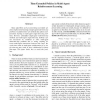Free Online Productivity Tools
i2Speak
i2Symbol
i2OCR
iTex2Img
iWeb2Print
iWeb2Shot
i2Type
iPdf2Split
iPdf2Merge
i2Bopomofo
i2Arabic
i2Style
i2Image
i2PDF
iLatex2Rtf
Sci2ools
ATAL
2004
Springer
2004
Springer
Time-Extended Policies in Multi-Agent Reinforcement Learning
Many algorithms such as Q-learning successfully address reinforcement learning in single-agent multi-time-step problems. In addition there are methods that address reinforcement learning in multi-agent single-time-step problems. However, unmodified single-agent multi-time-step methods and multi-agent single-time-step methods cannot necessarily be combined to solve multi-agent multi-time-step problems due to strong coupling between multi-agent interactions between time steps. Rewards that result in multi-agent collaboration for a single time-step may result in poor collaboration in future time-steps. This paper shows how to avoid this problem.
| Added | 01 Jul 2010 |
| Updated | 01 Jul 2010 |
| Type | Conference |
| Year | 2004 |
| Where | ATAL |
| Authors | Kagan Tumer, Adrian K. Agogino |
Comments (0)

